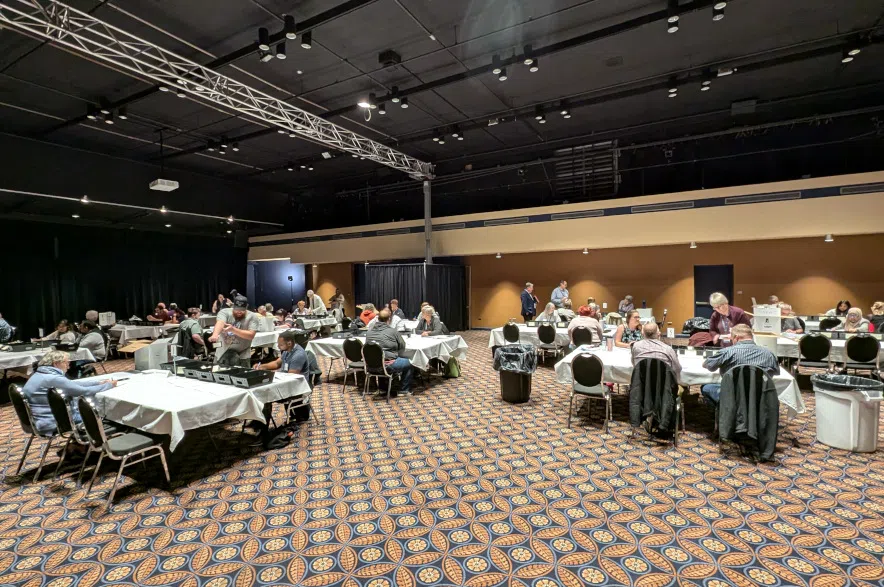Elections Saskatchewan is conducting its second preliminary count, and at least one riding has a different result.
The second count includes mail-in ballots which were received by Oct. 26.
Saskatoon Westview has changed hands from Saskatchewan Party’s two-term MLA David Buckingham to the Saskatchewan NDP’s April ChiefCalf. The riding’s final count was 3,464 for Sask. Party and 3,501 for NDP.
As of 12:30 p.m. on Oct. 30, the Sask. Party has 34 seats and the NDP has 27.
For a list of all the election results from the first preliminary count click here.
The final count will be on November 9.
NDP’s April CheifCalf reacts to seat swap
ChiefCalf said she was overwhelmed when she heard the news.
“It’s a bit of a nail biter when you’re waiting for the ballots to be counted,” she said.
“I’m extremely excited and honored to be representing the people of Saskatoon Westview.”
There was also a sense of relief for ChiefCalf when she saw the mail-in results.
On election night, the Sask. Party was led the riding by only a narrow margin, and ChiefCalf maintained optimism that the mail-in votes might swing in her favour.
“I kept telling people I am not counting my chickens before they’re hatched,” she said.
“When I left my office for the last day, I tidied up, but I didn’t pack anything up. I was optimistic that we could win the riding with really, really hard work.”
Throughout her campaign, ChiefCalf said she knew the Westview riding would pose a challenge, but she tried to hit every doorstep possible.
ChiefCalf said she focused on listening to voters to understand the issues more important to them such as education, healthcare and cost of living.
The NDP has nearly swept the big cities, but the Sask. Party secured the rural areas leading to victory.
ChiefCalf said it’s important to focus on the aspects that unite the province rather than divide it.
“In talking with other NDP candidates that were running in rural ridings, they were hearing a lot of the same things that we were hearing in urban ridings,” she said.
The final count of the remaining ballots will take place next week and ChiefCalf will remain cautiously optimistic about the outcome.
“I’m going to ride this positive feeling that I’m feeling today, and if things change on November 9, we’ll cross that bridge when we get to it,” she said.
Mail-in ballots being counted for provincial election
Two rooms downstairs were filled with tables, chairs and baskets on Wednesday, as election workers opened, counted and sorted more than 20,000 mail-in ballots for the provincial election.
Dr. Michael Boda, Saskatchewan’s Chief Electoral Officer, explained the ballots being counted Wednesday in the second preliminary count were the mail-in ballots that were received before Oct. 26.
Those received between Oct. 26 and Nov. 7 will be counted in the final count on Nov. 9. along with ballots collected from hospitals and remand centres.
“In 2020, we saw about 94 per cent of those (mail-in ballots) returned. That’s likely very high due to the fact that it was a COVID election in 2020,” said Boda.
At the beginning of Wednesday, there were nine constituencies where it was mathematically possible for the second-place candidate to pull into the lead with mail-in ballots that day.
After all the official counts, Boda said some recounts could be done, but it’s a bit more complicated in Saskatchewan than elsewhere — it’s not a fixed number of ballots or percentage.
Boda said there would be an automatic recount if there were a tie, but then the candidates would be the ones asking for it, not the chief electoral officer.
Between the number of rejected ballots and the number that were objected to, if the margin of victory were within that, Boda said candidates would also call for a recount.
Or, Boda said a candidate could also just go to a judge and ask for a recount.
The provincial government said ‘no’ to using electronic vote counters in the general election, so the ballots were counted by hand again. Boda said Elections Sask. made adjustments for that decision, bringing on more workers so they wouldn’t be counting until 3 a.m.
“We had run the calculations very carefully, and we were adding teams when we saw there were more ballots,” said Boda.
In 2020, Elections Saskatchewan had a lot of difficulty finding people to work the election, but Boda said it started early this time and created a community of people ahead of time, so there was no trouble finding workers this year.
– With files from 650 CKOM’s Mia Holowaychuk and 980 CJME’s Lisa Schick







